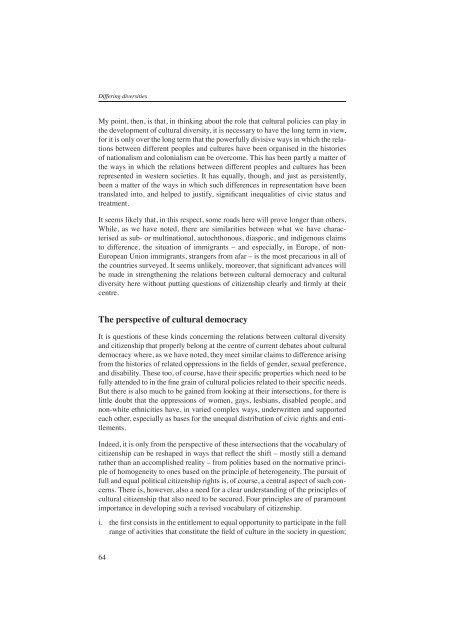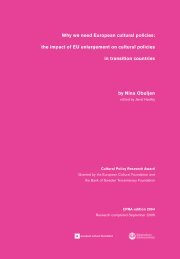Tony Bennett, Differing diversities - Council of Europe
Tony Bennett, Differing diversities - Council of Europe
Tony Bennett, Differing diversities - Council of Europe
Create successful ePaper yourself
Turn your PDF publications into a flip-book with our unique Google optimized e-Paper software.
<strong>Differing</strong> <strong>diversities</strong>My point, then, is that, in thinking about the role that cultural policies can play inthe development <strong>of</strong> cultural diversity, it is necessary to have the long term in view,for it is only over the long term that the powerfully divisive ways in which the relationsbetween different peoples and cultures have been organised in the histories<strong>of</strong> nationalism and colonialism can be overcome. This has been partly a matter <strong>of</strong>the ways in which the relations between different peoples and cultures has beenrepresented in western societies. It has equally, though, and just as persistently,been a matter <strong>of</strong> the ways in which such differences in representation have beentranslated into, and helped to justify, significant inequalities <strong>of</strong> civic status andtreatment.It seems likely that, in this respect, some roads here will prove longer than others.While, as we have noted, there are similarities between what we have characterisedas sub- or multinational, autochthonous, diasporic, and indigenous claimsto difference, the situation <strong>of</strong> immigrants – and especially, in <strong>Europe</strong>, <strong>of</strong> non-<strong>Europe</strong>an Union immigrants, strangers from afar – is the most precarious in all <strong>of</strong>the countries surveyed. It seems unlikely, moreover, that significant advances willbe made in strengthening the relations between cultural democracy and culturaldiversity here without putting questions <strong>of</strong> citizenship clearly and firmly at theircentre.The perspective <strong>of</strong> cultural democracyIt is questions <strong>of</strong> these kinds concerning the relations between cultural diversityand citizenship that properly belong at the centre <strong>of</strong> current debates about culturaldemocracy where, as we have noted, they meet similar claims to difference arisingfrom the histories <strong>of</strong> related oppressions in the fields <strong>of</strong> gender, sexual preference,and disability. These too, <strong>of</strong> course, have their specific properties which need to befully attended to in the fine grain <strong>of</strong> cultural policies related to their specific needs.But there is also much to be gained from looking at their intersections, for there islittle doubt that the oppressions <strong>of</strong> women, gays, lesbians, disabled people, andnon-white ethnicities have, in varied complex ways, underwritten and supportedeach other, especially as bases for the unequal distribution <strong>of</strong> civic rights and entitlements.Indeed, it is only from the perspective <strong>of</strong> these intersections that the vocabulary <strong>of</strong>citizenship can be reshaped in ways that reflect the shift – mostly still a demandrather than an accomplished reality – from polities based on the normative principle<strong>of</strong> homogeneity to ones based on the principle <strong>of</strong> heterogeneity. The pursuit <strong>of</strong>full and equal political citizenship rights is, <strong>of</strong> course, a central aspect <strong>of</strong> such concerns.There is, however, also a need for a clear understanding <strong>of</strong> the principles <strong>of</strong>cultural citizenship that also need to be secured. Four principles are <strong>of</strong> paramountimportance in developing such a revised vocabulary <strong>of</strong> citizenship.i. the first consists in the entitlement to equal opportunity to participate in the fullrange <strong>of</strong> activities that constitute the field <strong>of</strong> culture in the society in question;64














